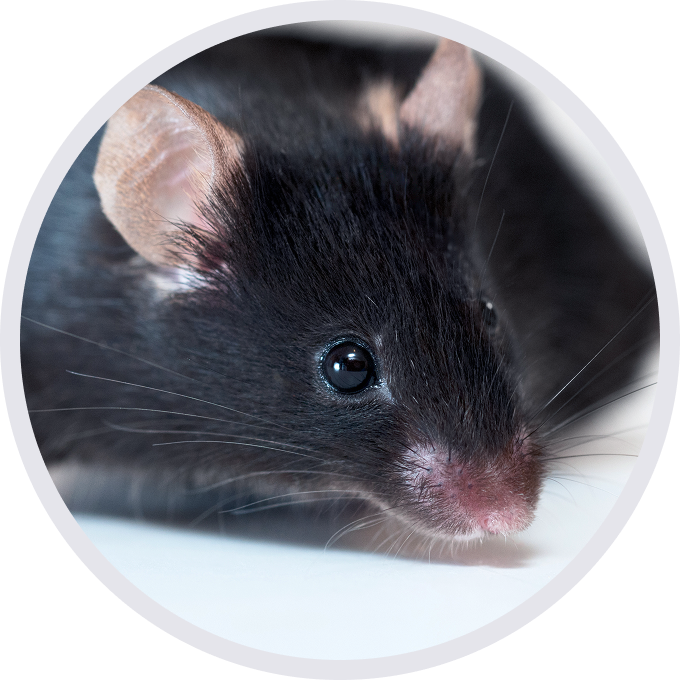
C57BL/6-Ctla4tm1(CTLA4)Bcgen Ccr8tm1(CCR8)Bcgen/Bcgen • 112251

| Product name | B-hCTLA4/hCCR8 mice |
|---|---|
| Catalog number | 112251 |
| Strain name | C57BL/6-Ctla4tm1(CTLA4)Bcgen Ccr8tm1(CCR8)Bcgen/Bcgen |
| Strain background | C57BL/6 |
| NCBI gene ID | 1237,1493 (Human) |
| Aliases | ALPS5; CD; CD152; CELIAC3; CTLA-4; GRD4; GSE; IDDM12; CC-CKR-8; CCR-8; CDw198; CKRL1; CMKBR8; CMKBRL2; CY6; GPRCY6; TER1; IDDM12; CC-CKR-8 |
Gene targeting strategy for B-hCTLA4/hCCR8 mice. The exon 2 of mouse Ctla4 gene that encode the extracellular domain was replaced by human CTLA4 exon 2 in B-hCTLA4/hCCR8 mice. The exon 2 that encoding the full coding sequence of mouse Ccr8 gene was replaced by exon 2 of human CCR8 gene in B-hCTLA4/hCCR8 mice.
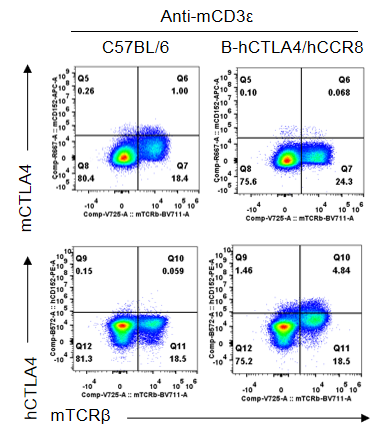
CTLA4 (CD152) protein expression analysis in B-hCTLA4/hCCR8 mice by FACS. Spleen was collected from wild-type mice and homozygous B-hCTLA4/hCCR8 mice stimulated with anti-mouse CD3ε antibody (7.5 μg, i.p.) in vivo for 24 hrs. Protein expression was analyzed with anti-mouse CTLA4 antibody (Biolegend, 106310) and anti-human CTLA4 antibody (Biolegend, 349906) by flow cytometry. Mouse CTLA4 was detectable in wild-type mice. Human CTLA4 was exclusively detectable in homozygous B-hCTLA4/hCCR8 but not in wild-type mice.
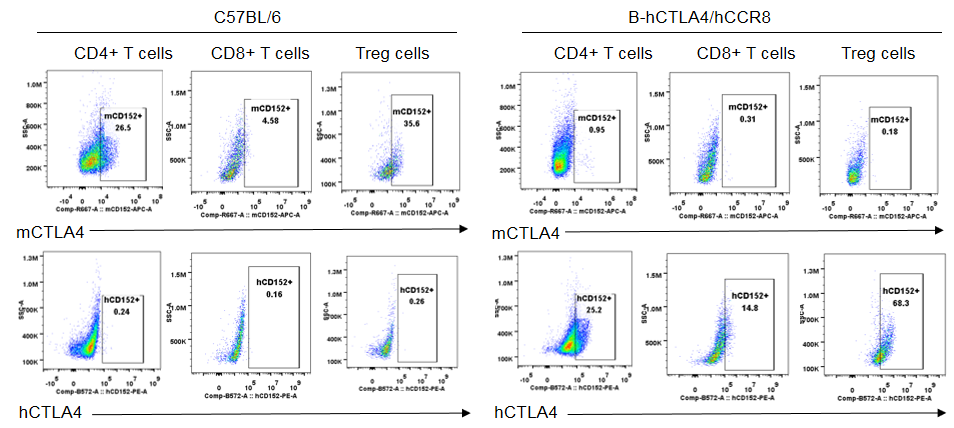
CTLA4 (CD152) protein expression analysis in B-hCTLA4/hCCR8 mice by FACS. Spleen was collected from wild-type mice and homozygous B-hCTLA4/hCCR8 mice stimulated with anti-mouse CD3ε antibody (7.5 μg, i.p.) in vivo for 24 hrs. Protein expression was analyzed with anti-mouse CTLA4 antibody (Biolegend, 106310) and anti-human CTLA4 antibody (Biolegend, 349906) by flow cytometry. Human CTLA4 was exclusively detectable in homozygous B-hCTLA4/hCCR8 mice. Mouse CTLA4 was exclusively detectable in wild-type C57BL/6 mice
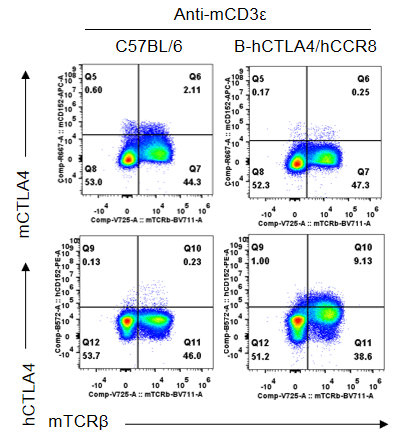
CTLA4 (CD152) protein expression analysis in B-hCTLA4/hCCR8 mice by FACS. Lymph node was collected from wild-type mice and homozygous B-hCTLA4/hCCR8 mice stimulated with anti-mouse CD3ε antibody (7.5 μg, i.p.) in vivo for 24 hrs. Protein expression was analyzed with anti-mouse CTLA4 antibody (Biolegend, 106310) and anti-human CTLA4 antibody (Biolegend, 349906) by flow cytometry. Mouse CTLA4 was detectable in wild-type mice. Human CTLA4 was exclusively detectable in homozygous B-hCTLA4/hCCR8 but not in wild-type mice.
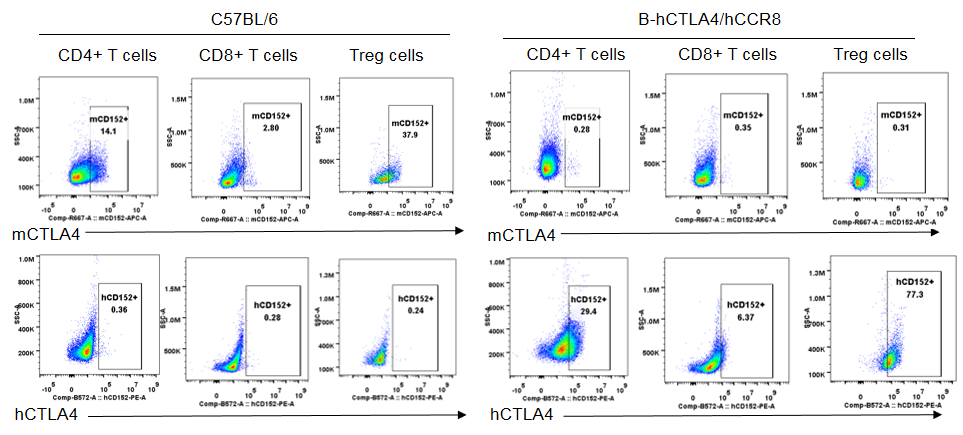
CTLA4 (CD152) protein expression analysis in B-hCTLA4/hCCR8 mice by FACS. Lymph node was collected from wild-type mice and homozygous B-hCTLA4/hCCR8 mice stimulated with anti-mouse CD3ε antibody (7.5 μg, i.p.) in vivo for 24 hrs. Protein expression was analyzed with anti-mouse CTLA4 antibody (Biolegend, 106310) and anti-human CTLA4 antibody (Biolegend, 349906) by flow cytometry. Human CTLA4 was exclusively detectable in homozygous B-hCTLA4/hCCR8 mice. Mouse CTLA4 was exclusively detectable in wild-type C57BL/6 mice.

CTLA4 (CD152) protein expression analysis in B-hCTLA4/hCCR8 mice by FACS. Murine colon cancer MC38 cells were subcutaneously implanted into homozygous B-hCTLA4/hCCR8 mice (female, 7 week-old, n=3). Tumor were harvested at tumor volume approximately 400-700 mm3 and analyzed with anti-mouse CTLA4 antibody (Biolegend, 106312) and anti-human CTLA4 antibody (Biolegend, 349906) by flow cytometry. Human CTLA4 was detectable in T cells in tumors of homozygous B-hCTLA4/hCCR8 mice
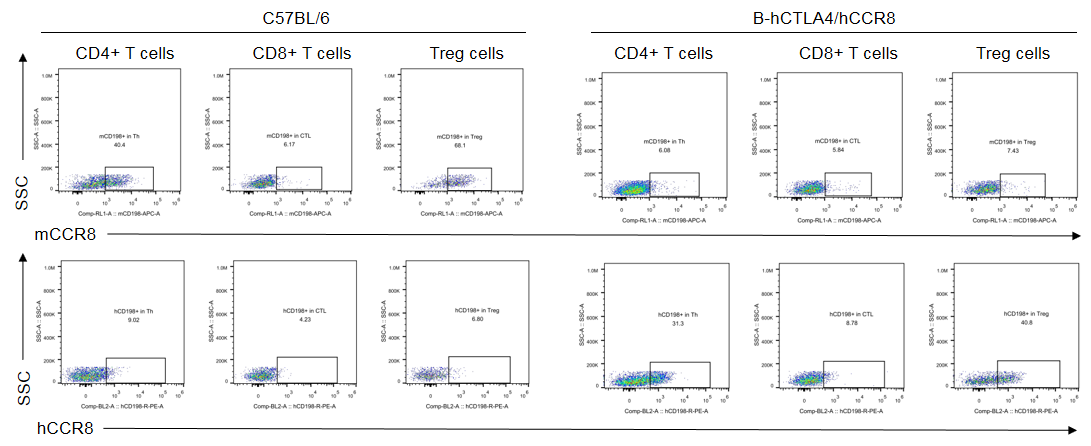
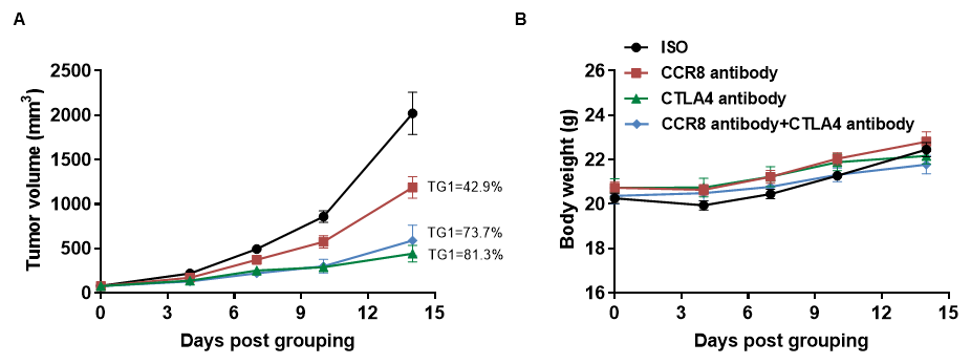
Antitumor activity of anti-human CCR8 antibody or anti-human CTLA4 antibody in B-hCTLA4/hCCR8 mice. (A) Anti-human CCR8 or CTLA4 antibody or combination of anti-human CTLA4 antibody and anti-human CCR8 antibody inhibited MC38 tumor growth in B-hCTLA4/hCCR8 mice. Murine colon cancer MC38 cells were subcutaneously implanted into homozygous B-hCTLA4/hCCR8 mice (female, 8-week-old, n=9). Mice were grouped when tumor volume reached approximately 80 mm3, at which time they were treated with anti-human CCR8 antibody or anti-human CTLA4 antibody indicated in panel. (B) Body weight changes during treatment. As shown in panel A, anti-human CCR8 or CTLA4 antibody or combination of anti-human CTLA4 antibody and anti-human CCR8 antibody were efficacious in controlling tumor growth in B-hCTLA4/hCCR8 mice. B-hCTLA4/hCCR8 mice provide a powerful preclinical model for in vivo evaluation of anti-human CCR8 and CTLA4 antibody. Valuesare expressed as mean ± SEM. (All data was provided by the client)